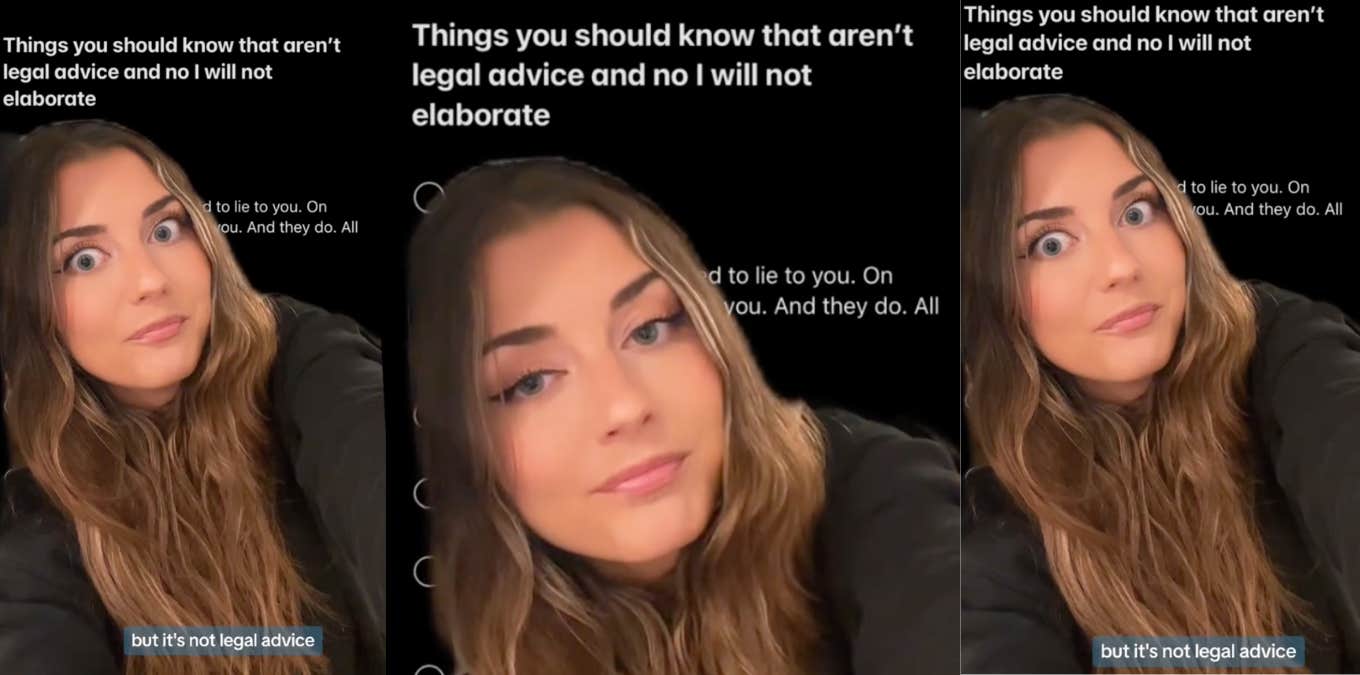Lawyer's Critical 'Things You Should Know That Aren't Legal Advice' Could Actually Save Your Life One Day
She shared her non-legal guidance with the masses as a form of protection.
 rebmasel / TikTok
rebmasel / TikTok An attorney named Reb Masel, who has a TikTok following of over 1 million people, utilizes the social media platform as a way to share her well-informed, acerbic takes on the various complexities of the legal world.
The lawyer shared a list of critical ‘things you should know that aren’t legal advice’.
Masel spoke directly to the camera in a greenscreen TikTok post, filming herself against the backdrop of a bulleted list. “This is ‘Things You Should Know’ based on what I have gathered as an attorney," she said. "No, I will not elaborate, meaning, I don’t care what you do with this, but it’s not legal advice.”
The first piece of guidance Masel made on her list of things that aren’t legal advice was harsh but direct, as she advised viewers to shut up. The second item on Masel’s list stated, “Cops are legally allowed to lie to you. On purpose. Yes, all of you. And they do. All the time. About anything.”
Next, she reemphasized her first point that people shouldn’t always speak up. By repeating the importance of keeping quiet in risky situations alongside the knowledge that police officers are legally permitted to lie, she underlines a major part of community care, focusing on the ways we can protect ourselves in relationships where power is imbalanced.
Masel’s fourth point of non-legal advice was “Some people suck.” She offered context, continuing, “They’re gonna be your friends, they’re gonna be your partners, they’re gonna be your homies.”
She imagined a potential response to that statement, saying, “‘But they would never…’ Yes. They would. They would and they will.”
 Photo: Sora Shimazaki / Pexels
Photo: Sora Shimazaki / Pexels
Her belief that people will cross those they claim to care for might seem like a bleak perspective on human nature, yet it can also be seen as a protective measure, a way to ensure that you’re prioritizing your own interests and needs.
The non-legal guidance she shared functions to remove power from people and institutions that misuse it and return an element of agency to regular citizens.
Masel’s next note touched on the projected intersection of wealth, power, and intelligence, as she stated. “Money does not mean smart or savvy or clever. Trust me on that one.” Her take held that millionaires uphold a certain level of mediocrity, describing them as regular people living in gated communities, while also insulting their intelligence.
She went on to note an undeniable truth: that in our reverted-mirror American reality, “luck [and] skin color” are what create the richest 1% of society. “Stop taking advice from them or trusting them, but mostly taking advice from them,” she continued. With this statement, Masel minimized the implicit power that the wealthy wield, giving that power back to those who deserve to have it.
“Anyone can file a lawsuit,” she stated, following that fact with what could be seen as a revelatory piece of information for anyone with a cell phone, which is everyone. She explained, “Your texts will be read in court. Every emoji, Every word. It doesn’t matter if it’s slang. They’ll ask you to explain it. Doesn’t matter if it’s an acronym. They’ll ask you to tell them what it’s abbreviated for.”
 Photo : Sora Shimazaki / Pexels
Photo : Sora Shimazaki / Pexels
Her next note connected to that prior piece of non-legal advice, as she advised people to call each other for activities that are less-than-legal and text each other for things that are important. She elaborated on the value of having a paper trail, saying, “When it’s important, like, talking about a contract, talking about events that… you’re gonna want to prove up later, maybe text it. Maybe email.”
“Next is, bring a friend,” she went on, explaining the value of having a witness for various interactions, in order to establish some record of events.
The last thing Masel shared was that “the singular second moment you step a single toe outside of your front door, you have an audience. You are in public, on the stage. You are putting on a show. You have an audience, even if you don’t think so, trust me, you do.”
The legal landscape in the United States certainly has elements that could be deemed highly problematic, yet it does exist for a reason.
Masel’s worldview is informed by her extensive experience in courtrooms. She has firsthand knowledge of an unfortunate truth — Not everyone can be trusted to have others’ best interests in mind.
By sharing her list of critical ways to engage the world, she’s offering people access to information that they can use to protect themselves from harm.
Alexandra Blogier is a writer on YourTango's news and entertainment team. She covers social justice issues, pop culture analysis and all things to do with the entertainment industry.

